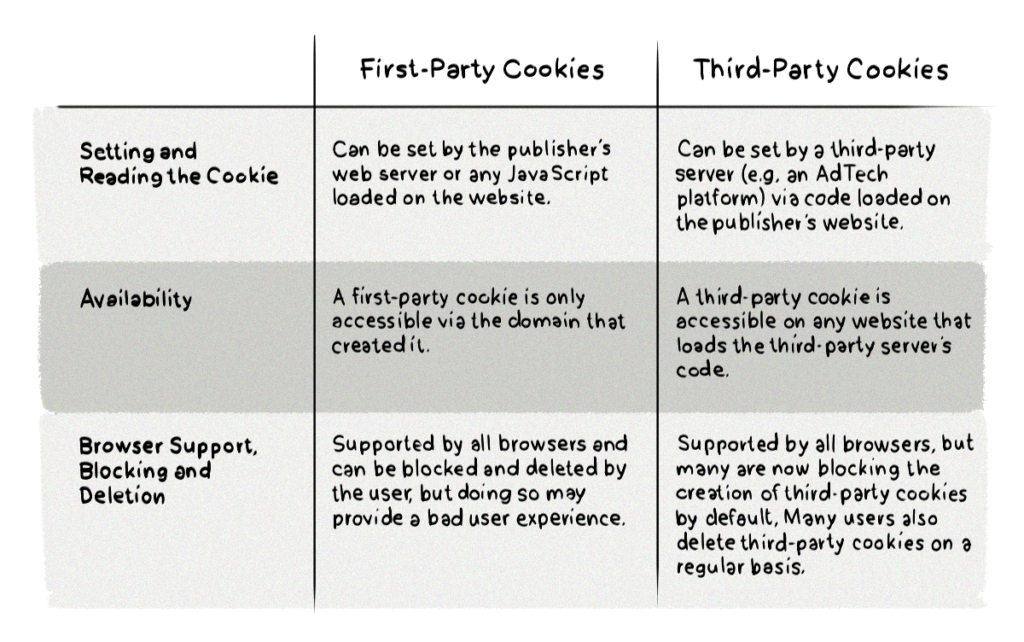
EDIT: Google has said they are delaying roll out of blocking third-party cookies until late 2023.
Google have announced they will phase out third-party cookies in their Chrome browser by 2022. Google Chrome accounts for 65.3% of all web browsing activity, although the runner-up browsers, Apple’s Safari and Mozilla’s Firefox, have already blocked third party cookies.
In this article, we will cover what third-party cookies are, why browsers are getting rid of third-party cookies and what Google is doing with their privacy sandbox initiative to ensure privacy for consumers and targeting effectiveness for advertisers.
What are Third-Party Cookies?
Cookies are files of code that are deployed to a searchers browser which sends information back to the owner of the website (first-party) you are visiting and/or other parties (third-parties). The information sent to third-parties is often user’s browser search histories (their behaviours on the web).
Let’s work through an example.
You are thinking of buying a cavoodle puppy! You visit a few websites in your search; cavoodle-personalities.com.au, cavoodle-breedersvic.com.au and puppy-school-fitzroy.com.au. Some of the websites you visited deployed first and third-party cookies onto your browser. The third-party cookies can send information back to, for example, Google, Facebook etc. so they can target ads to you. When you are on Facebook later that day, you might be served ads for pet insurance or a puppy school in your neighbourhood.
Here is a table that ClearCode put together showing the difference between first and third-party cookies:

Why Browsers are Getting Rid of Third-Party Cookies
The concern is that any company can use third-party cookies to farm people’s data, which can sometimes be more private than researching cavoodle puppies. Besides this, there are also security concerns with using third-party cookies as they can make websites vulnerable through malicious tracking, sensitive data leaks or cross-site request forgery.
How Google’s Chrome Update is Creating a New Way Forward for Privacy and Advertising Effectiveness
Google recognises that privacy and security is compromised through third-party cookies and have announced they will block them with their new Chrome browser update. Unlike other browsers, Google announced a new initiative that will increase privacy for users while still allowing advertisers to build behavioural audiences for marketing targeting purposes; the best of both worlds, if you will.
Privacy Sandbox technology for interest-based targeting (FLoC) will bundle users into interest buckets instead of identifying a single person and record their behaviours and interests.
Using the same puppy example, with FLoC, you would have been thrown into the “interested in buying a pet” bundle, but you as a specific user wouldn’t have been identified. This is meant to keep your data more secure while allowing users to be bundled into interest and behaviour categories for marketing purposes.
Google’s tests of FLoC show that advertisers can expect to see at least 95% of the conversions per dollar spent when compared to cookie-based advertising. In short, Google’s Chrome update is supporting publishers and advertisers to access FLoC audiences through their marketing platforms/campaigns, meaning the impact to advertisers and publishers is thought to be low.
If you have any questions about these changes and how they might impact your advertising, get in touch — our digital marketing consultants are happy to help!

Nicely explained, really there is no use of third party cookies now a days as per the recent google updates.
Glad to hear! Google has adapted to the concerns with third-party cookies and, I’m sure, will continue to update FLoC once the Chrome update is released. It certainly seems to be achieving the best of both privacy and tracking for marketing effectiveness.
This is a very nice blog. I have learned a lot of good and informative stuff from your blog.
Wonderful, really glad to hear it!